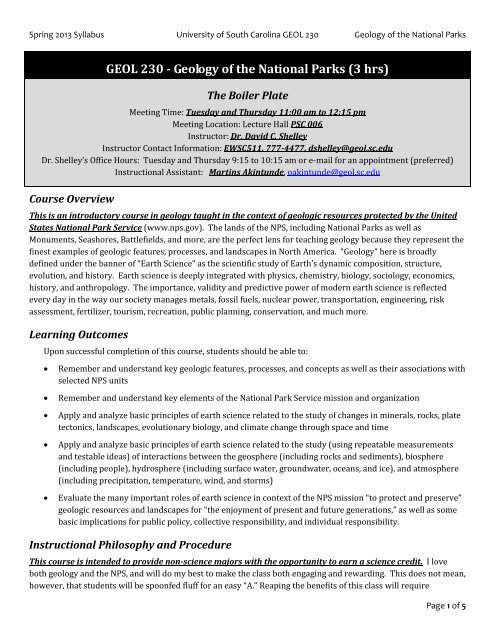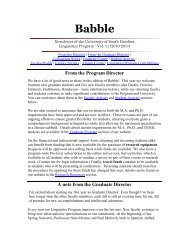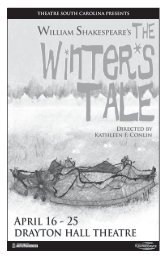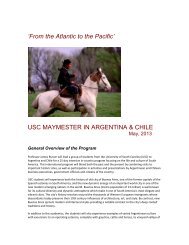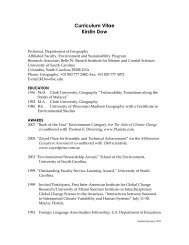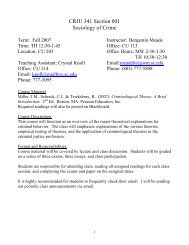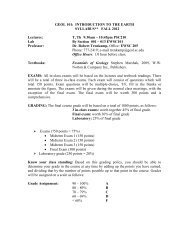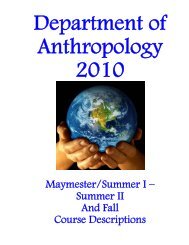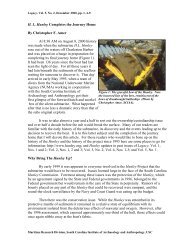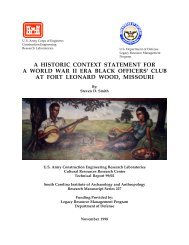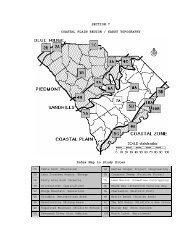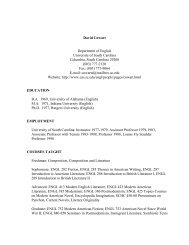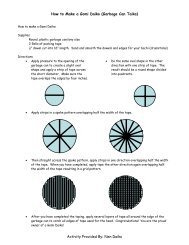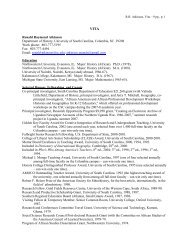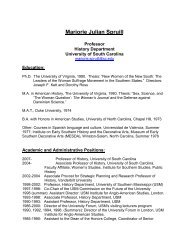GEOL 230 - Geology of the National Parks - College of Arts and ...
GEOL 230 - Geology of the National Parks - College of Arts and ...
GEOL 230 - Geology of the National Parks - College of Arts and ...
Create successful ePaper yourself
Turn your PDF publications into a flip-book with our unique Google optimized e-Paper software.
Spring 2013 Syllabus University <strong>of</strong> South Carolina <strong>GEOL</strong> <strong>230</strong> <strong>Geology</strong> <strong>of</strong> <strong>the</strong> <strong>National</strong> <strong>Parks</strong><br />
<strong>GEOL</strong> <strong>230</strong> - <strong>Geology</strong> <strong>of</strong> <strong>the</strong> <strong>National</strong> <strong>Parks</strong> (3 hrs)<br />
The Boiler Plate<br />
Meeting Time: Tuesday <strong>and</strong> Thursday 11:00 am to 12:15 pm<br />
Meeting Location: Lecture Hall PSC 006<br />
Instructor: Dr. David C. Shelley<br />
Instructor Contact Information: EWSC511, 777-4477, dshelley@geol.sc.edu<br />
Dr. Shelley’s Office Hours: Tuesday <strong>and</strong> Thursday 9:15 to 10:15 am or e-mail for an appointment (preferred)<br />
Instructional Assistant: Martins Akintunde, oakintunde@geol.sc.edu<br />
Course Overview<br />
This is an introductory course in geology taught in <strong>the</strong> context <strong>of</strong> geologic resources protected by <strong>the</strong> United<br />
States <strong>National</strong> Park Service ( www.nps.gov).<br />
The l<strong>and</strong>s <strong>of</strong> <strong>the</strong> NPS, including <strong>National</strong> <strong>Parks</strong> as well as<br />
Monuments, Seashores, Battlefields, <strong>and</strong> more, are <strong>the</strong> perfect lens for teaching geology because <strong>the</strong>y represent <strong>the</strong><br />
finest examples <strong>of</strong> geologic features, processes, <strong>and</strong> l<strong>and</strong>scapes in North America. “<strong>Geology</strong>” here is broadly<br />
defined under <strong>the</strong> banner <strong>of</strong> “Earth Science” as <strong>the</strong> scientific study <strong>of</strong> Earth’s dynamic composition, structure,<br />
evolution, <strong>and</strong> history. Earth science is deeply integrated with physics, chemistry, biology, sociology, economics,<br />
history, <strong>and</strong> anthropology. The importance, validity <strong>and</strong> predictive power <strong>of</strong> modern earth science is reflected<br />
every day in <strong>the</strong> way our society manages metals, fossil fuels, nuclear power, transportation, engineering, risk<br />
assessment, fertilizer, tourism, recreation, public planning, conservation, <strong>and</strong> much more.<br />
Learning Outcomes<br />
Upon successful completion <strong>of</strong> this course, students should be able to:<br />
• Remember <strong>and</strong> underst<strong>and</strong> key geologic features, processes, <strong>and</strong> concepts as well as <strong>the</strong>ir associations with<br />
selected NPS units<br />
• Remember <strong>and</strong> underst<strong>and</strong> key elements <strong>of</strong> <strong>the</strong> <strong>National</strong> Park Service mission <strong>and</strong> organization<br />
• Apply <strong>and</strong> analyze basic principles <strong>of</strong> earth science related to <strong>the</strong> study <strong>of</strong> changes in minerals, rocks, plate<br />
tectonics, l<strong>and</strong>scapes, evolutionary biology, <strong>and</strong> climate change through space <strong>and</strong> time<br />
• Apply <strong>and</strong> analyze basic principles <strong>of</strong> earth science related to <strong>the</strong> study (using repeatable measurements<br />
<strong>and</strong> testable ideas) <strong>of</strong> interactions between <strong>the</strong> geosphere (including rocks <strong>and</strong> sediments), biosphere<br />
(including people), hydrosphere (including surface water, groundwater, oceans, <strong>and</strong> ice), <strong>and</strong> atmosphere<br />
(including precipitation, temperature, wind, <strong>and</strong> storms)<br />
• Evaluate <strong>the</strong> many important roles <strong>of</strong> earth science in context <strong>of</strong> <strong>the</strong> NPS mission “to protect <strong>and</strong> preserve”<br />
geologic resources <strong>and</strong> l<strong>and</strong>scapes for “<strong>the</strong> enjoyment <strong>of</strong> present <strong>and</strong> future generations,” as well as some<br />
basic implications for public policy, collective responsibility, <strong>and</strong> individual responsibility.<br />
Instructional Philosophy <strong>and</strong> Procedure<br />
This course is intended to provide non-science majors with <strong>the</strong> opportunity to earn a science credit. I love<br />
both geology <strong>and</strong> <strong>the</strong> NPS, <strong>and</strong> will do my best to make <strong>the</strong> class both engaging <strong>and</strong> rewarding. This does not mean,<br />
however, that students will be spoonfed fluff for an easy “A.” Reaping <strong>the</strong> benefits <strong>of</strong> this class will require<br />
Page 1 <strong>of</strong> 5
Spring 2013 Syllabus University <strong>of</strong> South Carolina <strong>GEOL</strong> <strong>230</strong> <strong>Geology</strong> <strong>of</strong> <strong>the</strong> <strong>National</strong> <strong>Parks</strong><br />
consistent work, critical thinking, <strong>and</strong> engagement on your part. Much <strong>of</strong> <strong>the</strong> material in this course is cumulative,<br />
recursive, <strong>and</strong> interrelated, so attending class is critical. If you attend class, take notes, do <strong>the</strong> assigned readings,<br />
study your notes for a couple <strong>of</strong> hours each week, <strong>and</strong> make an effort to underst<strong>and</strong> <strong>the</strong> material <strong>the</strong>n you should at<br />
least pass <strong>the</strong> course. Good grades may require more work.<br />
The class will be structured as a series <strong>of</strong> lectures paired with reading assignments.<br />
• In general, <strong>the</strong> first half <strong>of</strong> <strong>the</strong> course will focus on <strong>the</strong> rock cycle, deformation, <strong>and</strong> tectonics, while <strong>the</strong> second<br />
half will focus on l<strong>and</strong>scapes <strong>and</strong> surficial processes.<br />
• The lecture <strong>and</strong> readings are designed to reinforce, supplement, <strong>and</strong> complement one ano<strong>the</strong>r but <strong>the</strong>y will not<br />
be identical. Quiz questions will be drawn from both sources even in areas that may not overlap.<br />
• Lectures will typically be presented in power point format, although <strong>the</strong>y may be supplemented by notes on<br />
<strong>the</strong> board, video clips, rock samples, or simple demonstrations. You are strongly encouraged to ask questions<br />
for clarification at any time during class. I will not, as a policy, post any notes or PowerPoint files on<br />
Blackboard. Taking notes is an important skill that undergraduates must “learn <strong>and</strong> earn.” If you miss class<br />
<strong>the</strong>n it is your responsibility to get <strong>the</strong> notes from someone else. I can only assist you with notes if you have a<br />
doctor’s note or o<strong>the</strong>r documentation for an excused absence, <strong>and</strong> this will involve coming to see me during my<br />
<strong>of</strong>fice hours.<br />
• Readings will focus on an NPS unit (or units) associated with <strong>the</strong> lecture topic, although <strong>the</strong> geologic story <strong>of</strong><br />
<strong>the</strong> park may involve much more than just <strong>the</strong> lecture topic. Focus on <strong>the</strong> lecture topic when you read, but<br />
don’t ignore over <strong>the</strong> rest <strong>of</strong> <strong>the</strong> material, as it may still show up on a quiz <strong>and</strong>/or later in <strong>the</strong> semester. I would<br />
advise you to mark up <strong>the</strong> book <strong>and</strong>/or take separate notes on <strong>the</strong> reading. Pictures are pretty to look at, but<br />
don’t ignore diagrams <strong>and</strong> charts when you read; <strong>the</strong>y contain a lot <strong>of</strong> information <strong>and</strong> may show up on <strong>the</strong><br />
quizzes. Readings, ei<strong>the</strong>r from <strong>the</strong> textbook or internet, may be read before or after <strong>the</strong> lectures – just be sure<br />
you have read <strong>the</strong>m in time for <strong>the</strong> quiz each Thursday. The required textbook is: Harris, A.G., Tuttle, E., <strong>and</strong><br />
Tuttle, S.D. 2003. <strong>Geology</strong> <strong>of</strong> <strong>the</strong> <strong>National</strong> <strong>Parks</strong> (6 th Ed.), Kendall Hunt Publishing Company, ISBN 978-<br />
0787299712, 896 pp. Some <strong>of</strong> <strong>the</strong> parks covered early in <strong>the</strong> semester will also be revisited during later<br />
lectures.<br />
I do ask that you respect my effort <strong>and</strong> o<strong>the</strong>r students’ attention during class. Earbuds, internet surfing,<br />
texting, phone conversations, <strong>and</strong> o<strong>the</strong>r non-<strong>GEOL</strong> <strong>230</strong> activities are not permitted in class. If I observe <strong>the</strong>se <strong>the</strong>n<br />
I reserve <strong>the</strong> right to ask you to leave for <strong>the</strong> day; this will also definitely count heavily against your class<br />
participation grade.<br />
Contacting me<br />
I have two <strong>of</strong>fices. I am in my campus <strong>of</strong>fice (EWSC 511) on Tuesdays <strong>and</strong> Thursdays, with <strong>of</strong>fice hours from<br />
9:15 to 10:15. My campus phone is 777-4477, although I am only able to check messages on Tuesday <strong>and</strong><br />
Thursday mornings. My second <strong>of</strong>fice is at Congaree <strong>National</strong> Park. My normal park <strong>of</strong>fice hours are Monday,<br />
Wednesday, <strong>and</strong> Friday from 7:30 am to 4:00 pm. My park <strong>of</strong>fice phone is 803.647.3966.<br />
As <strong>of</strong> <strong>the</strong> start <strong>of</strong> <strong>the</strong> semester I do not have a USC e-mail. This should change within a week or two. Until<br />
<strong>the</strong>n, please reach me at david_shelley@nps.gov.<br />
I typically only check e-mail once a day (probably morning).<br />
I manage a lot <strong>of</strong> e-mail at work. To make sure that I recognize your message as related to class, please include <strong>the</strong><br />
course title <strong>and</strong> year (<strong>GEOL</strong><strong>230</strong>/Spring2013) in <strong>the</strong> subject line <strong>and</strong> your first <strong>and</strong> last name somewhere in <strong>the</strong><br />
body <strong>of</strong> <strong>the</strong> e-mail. This will help me manage my inbox <strong>and</strong> get back to you in a timely manner.<br />
Page 2 <strong>of</strong> 5
Spring 2013 Syllabus University <strong>of</strong> South Carolina <strong>GEOL</strong> <strong>230</strong> <strong>Geology</strong> <strong>of</strong> <strong>the</strong> <strong>National</strong> <strong>Parks</strong><br />
Grading<br />
This course is heavily weighted (60%) towards regularly-spaced quizzes. On a positive note, this encourages<br />
you to attend class, encourages you to stay on top <strong>of</strong> <strong>the</strong> material throughout <strong>the</strong> semester, <strong>and</strong> reduces some<br />
stress around exam time. The potential downside is that <strong>the</strong> final exam, while important, will not be enough to<br />
“make up for lost time” if you slack <strong>of</strong>f along <strong>the</strong> way. Exams <strong>and</strong> a class participation grade will round out your<br />
quiz average.<br />
Quizzes are normally scheduled at <strong>the</strong> beginning <strong>of</strong> class on Thursday. They will include 10-15 multiple choice,<br />
short-answer, <strong>and</strong> drawing questions chosen from <strong>the</strong> readings <strong>and</strong> lecture assignments from <strong>the</strong> previous<br />
Thursday <strong>and</strong> Tuesday. You are responsible for bringing lined notebook paper for your quizzes. Questions will be<br />
read out loud <strong>and</strong>/or projected on <strong>the</strong> screen. Students will have ten minutes to complete <strong>the</strong> quiz <strong>and</strong> turn it in.<br />
Exams will essentially be cumulative, <strong>and</strong> cannot be dropped or replaced (see below). Points on quizzes will be<br />
taken <strong>of</strong>f for grammar, spelling, <strong>and</strong> h<strong>and</strong>writing.<br />
Quizzes cannot be made up if you are late or have an unexcused absence, but <strong>the</strong>re are some caveats. We all<br />
have lives. I will drop <strong>the</strong> lowest quiz grade during <strong>the</strong> semester. I will also allow you to replace at least one <strong>of</strong> <strong>the</strong><br />
lower grades with an optional bonus assignment. I will announce at least one optional bonus assignment during<br />
<strong>the</strong> semester, <strong>and</strong> hopefully more. Bonus assignments will be due two weeks from when <strong>the</strong>y are announced, <strong>and</strong><br />
may involve a non-class trip to Congaree <strong>National</strong> Park. If you complete a bonus assignment, <strong>the</strong>n this grade will<br />
replace your next lowest quiz grade (even if it is lower than your quiz grade).<br />
Your final grade will be averaged from quizzes, exams, <strong>and</strong> class participation using <strong>the</strong> following criteria:<br />
Item<br />
Count Grade Per Item<br />
Quiz Grades (13 quizzes, drop <strong>the</strong> lowest +/- substitutions) 12 4.62%<br />
Mid-Term Exam (counts as three quiz grades, with no option to drop) 1 15.00%<br />
Final Exam (counts as three quiz grades, with no option to drop) 1 15.00%<br />
Class participation (my subjective reflection on your attendance <strong>and</strong> engagement) 1 10.00%<br />
Total Grades 15 100.00%<br />
Averaged grades will be rounded to zero decimal places using st<strong>and</strong>ard conventions (i.e. 89.4 = 89) <strong>and</strong> graded on<br />
<strong>the</strong> following scale:<br />
A B+ B C+ C D+ D F<br />
90-100 87-89 80-86 77-79 70-76 66-69 60-65 0-60<br />
Academic Integrity<br />
All students at USC are expected to conform to <strong>the</strong> Code <strong>of</strong> Student Academic Responsibility. Specifically, “It is <strong>the</strong><br />
responsibility <strong>of</strong> every student at <strong>the</strong> University <strong>of</strong> South Carolina Columbia to adhere steadfastly to truthfulness<br />
<strong>and</strong> to avoid dishonesty, fraud, or deceit <strong>of</strong> any type in connection with any academic program. Any student who<br />
violates this rule shall be subject to discipline.” Fur<strong>the</strong>rmore, “any member <strong>of</strong> University community, who has<br />
reasonable grounds to believe that an infraction <strong>of</strong> <strong>the</strong> Code <strong>of</strong> Student Academic Responsibility has occurred, has<br />
an obligation to report <strong>the</strong> alleged violation.” Any cheating during quizzes or exams will result in an F for <strong>the</strong><br />
course. I will do my best to help you avoid cheating on exams <strong>and</strong> quizzes, but ultimately it is your responsibility.<br />
In simple language, I do not deal kindly with cheating. I never cheated in my entire school career. Never. Not<br />
once. I did not get A’s in everything, but I worked hard, did my best, <strong>and</strong> honestly earned everything I got. I<br />
have no respect or sympathy for students who seek to do o<strong>the</strong>rwise.<br />
Page 3 <strong>of</strong> 5
Spring 2013 Syllabus University <strong>of</strong> South Carolina <strong>GEOL</strong> <strong>230</strong> <strong>Geology</strong> <strong>of</strong> <strong>the</strong> <strong>National</strong> <strong>Parks</strong><br />
Class Schedule:<br />
Date # Lecture Topic Featured <strong>Parks</strong> Reading Q<br />
Tue, 01/15 1 Introduction to <strong>the</strong> Course Syllabus 1*<br />
Thu, 01/17 2 Introduction to <strong>the</strong> NPS http://www.nature.nps.gov/geology/to<br />
ur/index.cfm: Choose any three parks<br />
<strong>and</strong> read <strong>the</strong>ir field notes<br />
Fri, 01/18 Last Day to change classes<br />
without a W<br />
Tue, 01/22 3 Earth System Science http://www.earthscienceliteracy.org/es_l<br />
Thu, 01/24 4 Dots, Wiggles, Shapes: Making<br />
Meaningful Stories from<br />
Geologic Observations<br />
Tue, 01/29 5 Building Blocks: From Minerals<br />
to Tectonic Plates<br />
iteracy_6may10_.pdf: ALL<br />
http://www.agiweb.org/environment/pu<br />
blications/mapping/mappingbook.pdf:<br />
Pages 1-31<br />
http://geomaps.wr.usgs.gov/parks/rxmin<br />
/index.html: Top four links, simplified<br />
rock classification chart;<br />
http://pubs.usgs.gov/gip/dynamic/dynam<br />
ic.html: Top four links<br />
Thu, 01/31 6 Measures <strong>of</strong> Time Gr<strong>and</strong> Canyon http://pubs.usgs.gov/gip/fossils/contents.<br />
html: all ,TB: Ch. 1<br />
3<br />
Tue, 02/05 7 Rocks: Igneous Yosemite TB: Intro. to Part IV, Ch. 28, Box 25.1<br />
Thu, 02/07 8 Rocks: Sedimentary Gr<strong>and</strong> Canyon,<br />
Zion<br />
TB: Ch. 1, 2 4<br />
Tue, 02/12 9 Rocks: The Fossil Record Petrified Forest<br />
<strong>and</strong> Badl<strong>and</strong>s<br />
TB: Ch. 8, 9<br />
Thu, 02/14 10 Rocks: Metamorphism <strong>and</strong><br />
Deformation<br />
Acadia TB: Intro. to Part V, Ch. 24 5<br />
Tue, 02/19 11 Tectonics: Rifts Death Valley TB: Ch. 48<br />
Thu, 02/21 12 Tectonics: Ocean Plates <strong>and</strong><br />
Subduction<br />
Olympic TB: Ch. 30, Box 35.1 6<br />
Tue, 02/26 13 Tectonics: Thrust Belts Great Smoky<br />
Mountains<br />
TB: Ch. 55<br />
Thu, 02/28 14 Tectonics: Mafic Volcanics Hawaii<br />
Volcanoes<br />
TB: Ch. 40 7<br />
Tue, 03/05 15 Tectonics: Felsic Volcanics Yellowstone TB: Ch. 43<br />
Thu, 03/07 16 Review <strong>and</strong> Exam All <strong>Parks</strong> from All readings since 1/15 Q8,<br />
Part I<br />
E1*<br />
Tue, 03/12 No Class - Spring Break<br />
Thu, 03/14 No Class - Spring Break<br />
Tue, 03/19 17 Wea<strong>the</strong>ring, Erosion, <strong>and</strong> Soil Bryce Canyon.<br />
Capitol Reef<br />
TB: Intro. to Part I, Ch. 3, 4<br />
Thu, 03/21 18 Evaporites <strong>and</strong> Aeolian<br />
Great S<strong>and</strong> TB: Ch. 12,<br />
9<br />
Processes<br />
Dunes, Indiana http://www.nature.nps.gov/geology/par<br />
Dunes, White ks/indu/index.cfm,<br />
S<strong>and</strong>s<br />
http://www.nature.nps.gov/geology/par<br />
ks/whsa/index.cfm<br />
Tue, 03/26 19 Wetl<strong>and</strong>s <strong>and</strong> Organic<br />
Sediments<br />
Everglades TB: Ch. 19, Box 20.1<br />
Thu, 03/28 20 Carbonates Guadalupe<br />
Mountains <strong>and</strong><br />
Virgin Isl<strong>and</strong>s<br />
TB: Intro. to Part II, Ch. 17, 18 10<br />
Tue, 04/02 21 Caves Mammoth Cave<br />
<strong>and</strong> Wind Cave<br />
TB: Ch. 14, 15<br />
Thu, 04/04 22 Glaciers, Alpine Glacier Bay TB: Intro. to Part III, Ch. 31 11<br />
2<br />
Page 4 <strong>of</strong> 5
Spring 2013 Syllabus University <strong>of</strong> South Carolina <strong>GEOL</strong> <strong>230</strong> <strong>Geology</strong> <strong>of</strong> <strong>the</strong> <strong>National</strong> <strong>Parks</strong><br />
Date # Lecture Topic Featured <strong>Parks</strong> Reading Q<br />
Tue, 04/09 23 Glaciers, Continental Cuyahoga<br />
Valley,<br />
Voyageurs<br />
TB: Ch. 13, 22<br />
Thu, 04/11 24 Coastlines Fire Isl<strong>and</strong>, http://www.nature.nps.gov/geology/par 12<br />
Channel Isl<strong>and</strong>s, ks/fiis/index.cfm,<br />
Kenai Fjords, http://www.nature.nps.gov/geology/par<br />
Cumberl<strong>and</strong> ks/kefj/index.cfm,<br />
Isl<strong>and</strong><br />
http://www.nature.nps.gov/geology/par<br />
ks/cuis/index.cfm, VIDEO (18 min.):<br />
http://www.nps.gov/chis/photosmultime<br />
dia/a-treasure-in-<strong>the</strong>-sea.htm<br />
Tue, 04/16 25 Rivers <strong>and</strong> Floodplains Congaree TBA<br />
Thu, 04/18 26 Geoarchaeology <strong>and</strong> Geologic Mesa Verde, TB: Ch. 7,<br />
13<br />
Heritage<br />
Chesapeake <strong>and</strong> http://www.nature.nps.gov/geology/par<br />
Ohio Canal, ks/choh/index.cfm,<br />
Russell Cave http://www.nature.nps.gov/geology/par<br />
ks/ruca/index.cfm<br />
Tue, 04/23 27 Climate Change TBA http://cleanet.org/cln/index.html,<br />
Thu, 04/25 28 Summary, Review, <strong>and</strong><br />
All <strong>Parks</strong> from All readings since 3/19 14<br />
Evaluations<br />
Part II<br />
Fri, 05/03 29 Final Exam All <strong>Parks</strong> from<br />
Part II<br />
All readings since 3/19 E2*<br />
*Quizzes <strong>and</strong> exams marked “*” cannot be dropped or replaced<br />
Final Note<br />
This syllabus has been pre-planned to <strong>the</strong> best <strong>of</strong> my ability, but <strong>the</strong> lecture topics,<br />
sequence, readings, <strong>and</strong> quiz schedule are subject to change as <strong>the</strong> semester unfolds. I will<br />
clearly announce any such changes in class. I will not penalize you or your grade if <strong>the</strong>re is<br />
a sudden change less than two class periods ahead <strong>of</strong> time.<br />
Page 5 <strong>of</strong> 5


